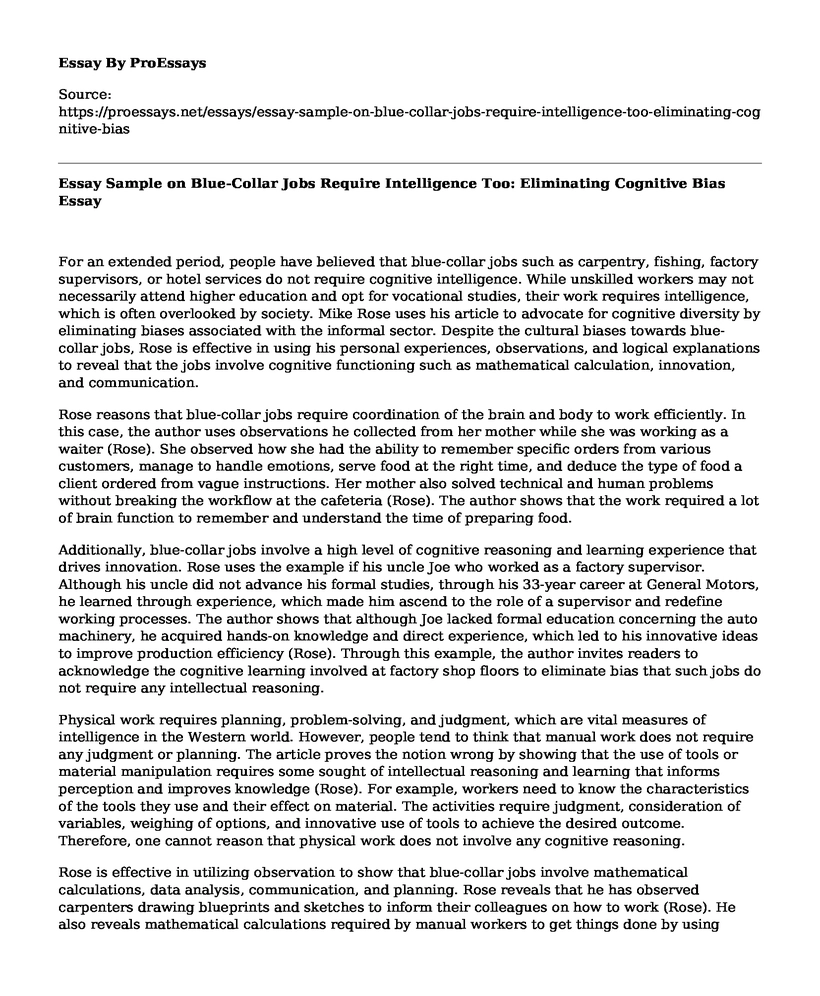For an extended period, people have believed that blue-collar jobs such as carpentry, fishing, factory supervisors, or hotel services do not require cognitive intelligence. While unskilled workers may not necessarily attend higher education and opt for vocational studies, their work requires intelligence, which is often overlooked by society. Mike Rose uses his article to advocate for cognitive diversity by eliminating biases associated with the informal sector. Despite the cultural biases towards blue-collar jobs, Rose is effective in using his personal experiences, observations, and logical explanations to reveal that the jobs involve cognitive functioning such as mathematical calculation, innovation, and communication.
Rose reasons that blue-collar jobs require coordination of the brain and body to work efficiently. In this case, the author uses observations he collected from her mother while she was working as a waiter (Rose). She observed how she had the ability to remember specific orders from various customers, manage to handle emotions, serve food at the right time, and deduce the type of food a client ordered from vague instructions. Her mother also solved technical and human problems without breaking the workflow at the cafeteria (Rose). The author shows that the work required a lot of brain function to remember and understand the time of preparing food.
Additionally, blue-collar jobs involve a high level of cognitive reasoning and learning experience that drives innovation. Rose uses the example if his uncle Joe who worked as a factory supervisor. Although his uncle did not advance his formal studies, through his 33-year career at General Motors, he learned through experience, which made him ascend to the role of a supervisor and redefine working processes. The author shows that although Joe lacked formal education concerning the auto machinery, he acquired hands-on knowledge and direct experience, which led to his innovative ideas to improve production efficiency (Rose). Through this example, the author invites readers to acknowledge the cognitive learning involved at factory shop floors to eliminate bias that such jobs do not require any intellectual reasoning.
Physical work requires planning, problem-solving, and judgment, which are vital measures of intelligence in the Western world. However, people tend to think that manual work does not require any judgment or planning. The article proves the notion wrong by showing that the use of tools or material manipulation requires some sought of intellectual reasoning and learning that informs perception and improves knowledge (Rose). For example, workers need to know the characteristics of the tools they use and their effect on material. The activities require judgment, consideration of variables, weighing of options, and innovative use of tools to achieve the desired outcome. Therefore, one cannot reason that physical work does not involve any cognitive reasoning.
Rose is effective in utilizing observation to show that blue-collar jobs involve mathematical calculations, data analysis, communication, and planning. Rose reveals that he has observed carpenters drawing blueprints and sketches to inform their colleagues on how to work (Rose). He also reveals mathematical calculations required by manual workers to get things done by using logical explanations. For example, he illustrates how a cabinetmaker uses measurements, logic, reasoning to create a carbine that structurally fit the kitchen wall. The illustrations reveal that for any manual work to be completed, a worker must reason, calculate and make logical moves that ensure attainment of the final goal.
Overall, the author was successful in his use of examples and logical explanations to inform on cognitive intelligence required to perform blue-collar jobs. While intelligence is often linked to formal education, it is also present in the informal sector. By using logos in his writing, the author allows readers to realize cognitive variability in different types of jobs. All jobs require mental reasoning despite the occupation as opposed to conventional thinking. People should not use occupation or job categories as a measure of intelligence if they want to transcend beyond cultural divides.
Work Cited
Rose, Mike. "Blue-Collar Brilliance." The American Scholar, 1 June 2009. https://theamericanscholar.org/blue-collar-brilliance/#.XaGkeugzbIU. Accessed on 12 Oct. 2019.
Cite this page
Essay Sample on Blue-Collar Jobs Require Intelligence Too: Eliminating Cognitive Bias. (2023, Feb 27). Retrieved from https://proessays.net/essays/essay-sample-on-blue-collar-jobs-require-intelligence-too-eliminating-cognitive-bias
If you are the original author of this essay and no longer wish to have it published on the ProEssays website, please click below to request its removal:
- Application Example for the Passenger Service Agent Position
- Essay Sample on Shift from Training to Performance
- Assignments on Epidemiology and Healthcare Reflection Professions
- Nursing Professional Statement Example
- Building and Maintaining Professional Relationships Essay
- Wage Rigidity: Causes & Consequences of Sticky Wages - Essay Sample
- Chemistry Majors: Preparing for a Multitude of Career Paths - Essay Sample







